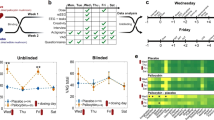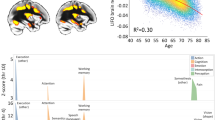Abstract
The Benton Visual Retention Test (BVRT) is a widely used test for the evaluation of visuospatial memory. Alternate forms and various types of administration are available. Whereas most of the formats are visuoconstructional tasks, the forms F and G involve visual recognition. There are several reasons to use multiple-choice formats when studying age-related memory changes. Its procedure involving immediate recognition of geometric designs allows assessment of visuospatial working memory—a memory system particularly vulnerable to aging. The administration is rapid —it can be completed in 5 min—and is easily standardized. The multiple-choice format, relative to the drawing-response formats, also has the advantage of eliminating the influence of visuomotor and manual dexterity problems common in the elderly. Another advantage is the possibility of referring to recent geriatric norms, which can help clinicians or researchers identify individuals with low scores and potentially at risk for dementia.
This is a preview of subscription content, access via your institution
Access options
Subscribe to this journal
Receive 12 print issues and online access
$259.00 per year
only $21.58 per issue
Buy this article
- Purchase on Springer Link
- Instant access to full article PDF
Prices may be subject to local taxes which are calculated during checkout

Similar content being viewed by others
References
Sivan, A.B. Benton Visual Retention Test 5th edition. (The Psychological Corporation, San Antonio, TX, 1992).
Benton, A.L. The Visual Retention Test (The Psychological Corporation, New York, 1955).
Craik, F.I.M. & Jennings, J.M. Human memory. In The Handbook of Aging and Cognition (eds. Craik, F.I.M., & Salthouse, T.A.) 51–110 (Lawrence Erlbaum Associates, Hillsdale, New Jersey, 1992).
Hultsch, D.F., Hertzog, C., Dixon, R.A. & Small, B.J. Memory Change in the Aged (Cambridge University Press, New York, 1998).
Benton, A.L., Hamsher, K., De, S., Varney, N. & Spreen, O. Contributions to Neuropsychological Assessment: A Clinical Manual (Oxford University Press, New York, 1983).
Lechevallier-Michel, N., Fabrigoule, C., Lafont, S., Letenneur, L. & Dartigues, J.F. Normative data for the MMSE, the Benton visual retention test, the Isaacs's set test, the digit symbol substitution test and the Zazzo's cancellation task in subjects over the age 70: results from the PAQUID Study. Rev. Neurol. 160, 1059–1070 (2004).
Tuokko, H. & Woodward, T.S. Development and validation of a demographic correction system for neuropsychological measures used in the Canadian Study of Health and Aging. J. Clin. Exp. Neuropsychol. 18, 479–616 (1996).
Coman, E. et al. Geriatric performance on the Benton Visual Retention Test: Demographic and diagnostic considerations. Clin. Neuropsychol. 13, 66–77 (1999).
Le Carret et al. The effect of education on cognitive performances and its implication for the constitution of the 'cognitive reserve'. Dev. Neuropsychol. 23, 317–337 (2003).
Giambra, L.M., Arenberg, D., Kawas, C., Zonderman, A.B. & Costa, P.T. Adult life span changes in immediate visual memory and verbal intelligence. Psychol. Aging 10, 123–139 (1995).
Le Carret, N. et al. Influence of education on the Benton visual retention test performance as mediated by a strategic search component. Brain Cognition 53, 408–411 (2003).
Byrd, D.A., Jacobs, D.M., Hilton, H.J., Stern, Y. & Manly, J.J. Sources of errors on visuoperceptual tasks: role of education, literacy, and search strategy. Brain Cognition 58, 251–257 (2005).
Benton, A.L. Manuel du Test de Rétention Visuelle (Les Editions du Centre de Psychologie Appliquée, Paris, 1965).
Benton Sivan, A. & Spreen, O. Der Benton Test (Hand, Bern, Switzerland, 1996).
Lezak, M. Neuropsychological Assessment (Oxford University Press, New York, 2004).
Amieva, H., et al. The 9-year cognitive decline before dementia of the Alzheimer type: a prospective population-based study. Brain 128, 1093–1101 (2005).
Jacqmin-Gadda, H., Fabrigoule, C., Commenges, D., Letenneur, L. & Dartigues, J.F. A cognitive screening battery for dementia in the elderly. J. Clin. Epidemiol. 53, 980–987 (2000).
Commenges, D. et al. Improving screening for dementia in the elderly using Mini-Mental State Examination subscores, Benton's Visual Retention Test, and Isaacs' Set Test. Epidemiology 3, 185–188 (1992).
Author information
Authors and Affiliations
Corresponding author
Ethics declarations
Competing interests
The authors declare no competing financial interests.
Rights and permissions
About this article
Cite this article
Amieva, H., Gaestel, Y. & Dartigues, JF. The multiple-choice formats (forms F and G) of the Benton Visual Retention Test as a tool to detect age-related memory changes in population-based studies and clinical settings. Nat Protoc 1, 1936–1938 (2006). https://doi.org/10.1038/nprot.2006.302
Published:
Issue Date:
DOI: https://doi.org/10.1038/nprot.2006.302
This article is cited by
Comments
By submitting a comment you agree to abide by our Terms and Community Guidelines. If you find something abusive or that does not comply with our terms or guidelines please flag it as inappropriate.



